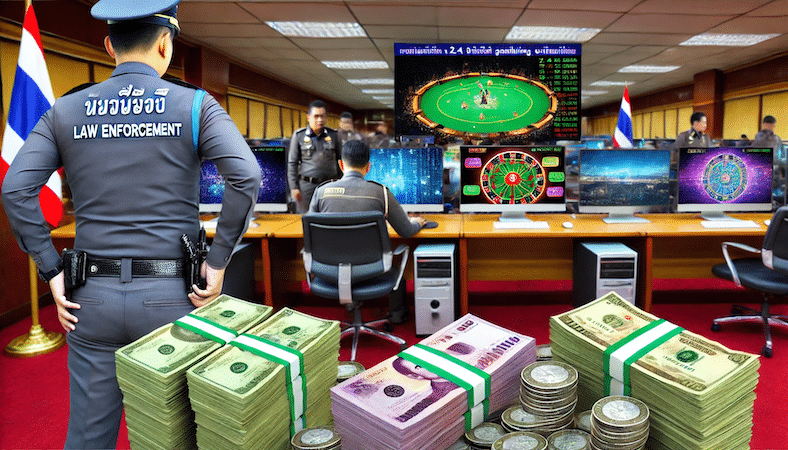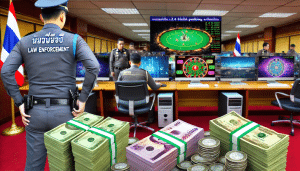In a significant effort to combat illegal gambling, Thai law enforcement has shut down over 200 websites involved in Euro 2024 soccer betting. This major operation aimed to reduce illegal betting activities linked to the popular soccer tournament. An estimated 2.4 billion baht (approximately $66.3 million) was discovered circulating through these black market platforms.
Widespread Crackdown on Both Land-Based and Online Operations
Starting on June 14, the day Euro 2024 finals began, and concluding on Thursday, this crackdown was led by Pol Lt Gen Akradet Pimolsri, an assistant national police chief. A specialized task force was formed to address soccer betting cases, resulting in the arrest of 3,863 individuals suspected of gambling-related offenses.
Among those apprehended, 3,017 were caught at physical gambling dens, which included 50 alleged bookies and 2,944 alleged gamblers. This underscores the extensive reach of illegal betting. Additionally, law enforcement shut down 224 local gambling websites, capturing 846 suspects in the process. Out of these, 145 were identified as operators of the websites, and 701 were gamblers using these online platforms.
The operation revealed the lucrative nature of illegal gambling, especially during major sporting events like Euro 2024. With 2.4 billion baht in circulation, the crackdown highlighted serious concerns about the proliferation of unlicensed gambling.
Persistent Issues with Black Market Operators
Thanakorn Komkrit, the secretary general of the Stop Gambling Foundation in Thailand, had anticipated a significant rise in soccer betting during Euro 2024. Despite the efforts of the authorities, Komkrit emphasized the ongoing challenges posed by the black market. He noted that the potential profits often outweigh the fear of legal repercussions.
In May, the Ministry of Finance shut down about 6,500 illegal gambling websites, but these actions had limited success. Komkrit pointed out that new outlets quickly fill the void left by banned entities, and even previously shut-down websites can circumvent restrictions and return to the market with a new appearance.
Continuing Vigilance and Commitment
Despite these challenges, Thai law enforcement demonstrated a strong commitment to tackling illegal gambling during Euro 2024. This operation showcased the government’s dedication to reducing the societal impacts of illegal betting. Authorities remain vigilant and are using the lessons learned from this crackdown to prepare for other upcoming high-profile sports events.
The concerted efforts of Thai law enforcement highlight the ongoing battle against illegal gambling, aiming to protect the integrity of sports in the country. With a focus on both land-based and online operations, the authorities are determined to address this issue and curb illegal betting activities effectively.
Legality of Gambling in Thailand and South East Asia
In Thailand, gambling is largely illegal under the Gambling Act of 1935, which prohibits most forms of betting except for the national lottery and horse racing at licensed tracks. The strict regulations are enforced rigorously, with significant penalties for those caught participating in or facilitating illegal gambling activities. Despite these stringent laws, underground gambling remains prevalent, particularly during major sporting events, prompting frequent crackdowns by Thai law enforcement. Online gambling is also banned, but many Thai citizens still access international online casinos, utilizing VPNs and other means to circumvent local restrictions.
The legal landscape for gambling in other South East Asian countries varies significantly. For example, in Singapore, gambling is legal and regulated through the Casino Control Act and the Remote Gambling Act, allowing both physical and online gambling under strict regulatory oversight. Malaysia also permits gambling but only within licensed venues like Genting Highlands, while online gambling remains illegal. Conversely, countries like Indonesia and Brunei adopt a zero-tolerance policy towards all forms of gambling, reflecting their strict adherence to Islamic law. Vietnam has recently begun to relax its gambling laws, allowing locals to enter certain casinos under a pilot program, while Cambodia is known for its relatively liberal stance, with a flourishing casino industry, especially in border towns catering to foreign tourists.


